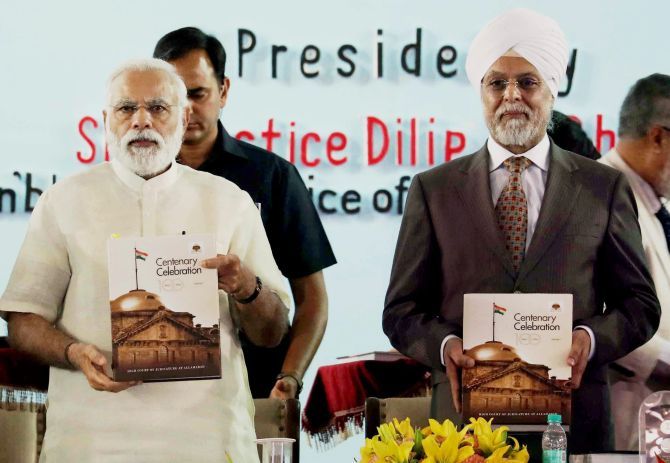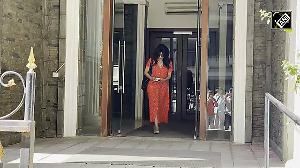
Three Constitution benches will sit during the summer vacation of the Supreme Court to help reduce the number of pending cases, Chief Justice J S Khehar said in Allahabad on Sunday.
He also requested the judges to consider sitting in courts for five days during the vacation to clear at least 10 cases each day and bring down the pendency.
"This way thousands of small matters like matrimonial disputes and mediation cases can be settled and arrears of cases brought down," Justice Khehar said in his address at the sesquicentennial celebrations of the Allahabad high court.
"At the Supreme Court, we will set up three five-judge benches for hearing important matters like triple talaq during vacation," he said.
A Constitution bench will hear petitions challenging Muslim practices of triple talaq, nikah halala and polygamy from May 11.
Along with the triple talaq matter, the Supreme Court will also hear cases related to Aadhaar and WhatsApp during the nearly 50-day summer vacation.
This will be the first time at the court’s 67-year-old history that three Constitution benches will sit during the summer break.
"The situation (with regard to huge backlogs and paucity of judges), is what it is. The question is whether we, judges and advocates, can do something. I have been working during vacations ever since I became a Supreme Court judge.
"Ditto for Law Commission Chairman Justice B S Chauhan, who is seated here. It is a question of whether we are ready to take the challenge," the CJI said.
"We in the legal profession are at a turning point, a defining moment. We ought to make some sacrifices," he said.
In his nearly 40-minute speech, the CJI briefly switched to Hindi and, turning towards Prime Minister Narendra Modi, said, "In presence of the PM, whose ‘Mann ki Baat’ is followed by people across the country, I wish to do some ‘dil ki baat’ (speak from the heart)."
Later, in his speech, Modi quipped that he was listening ‘mann se (intently)’ to the CJI’s ‘dil ki baat’.
The CJI recalled, “An issue like the NJAC (National Judicial Appointments Commission) was heard by us during vacations. If such a complex issue can be heard during vacations, why not other smaller matters? I would request judges and lawyers to rise to the occasion and take similar initiatives.”
On the Allahabad high court, he said, “This high court has a glorious tradition. Five Chief Justices of India and 20 judges of Supreme Court have come from here. If every judge here agrees to work for five days during a vacation, he may dispose of an additional 25 cases per day and about 125 matters during the five-day period.”
"If the 80 plus judges of this high court agree to do likewise, they might bring down the pendency by 10,000 if not more," the CJI said.
He also said that ‘a pilot project has been launched by us, based on suggestions from noted American jurist John Clifford Wallace, for drastically reducing the time that is spent on disposal of cases. Based on its success, the experiment may be replicated elsewhere’.
The CJI also said, “There are many cases that arise out of egos, for example matrimonial disputes, which can be settled in mediation. Similarly, Lok Adalats could be an effective way for disposing of matters that are of a less serious nature. Judges and advocates need to sit together and think about this.”
Khehar also underscored the role played by technology in making the judicial machinery more efficient and envisaged a time when ‘courts will become paperless’.
"This will save both time and money," he added.
IMAGE: Prime Minister Narendra Modi with Chief Justice of India Justice J S Khehar releasing sesquicentennial book at the closing ceremony of the Sesquicentennial Celebrations of Allahabad high court, in Uttar Pradesh on Sunday. Photograph: PTI Photo





